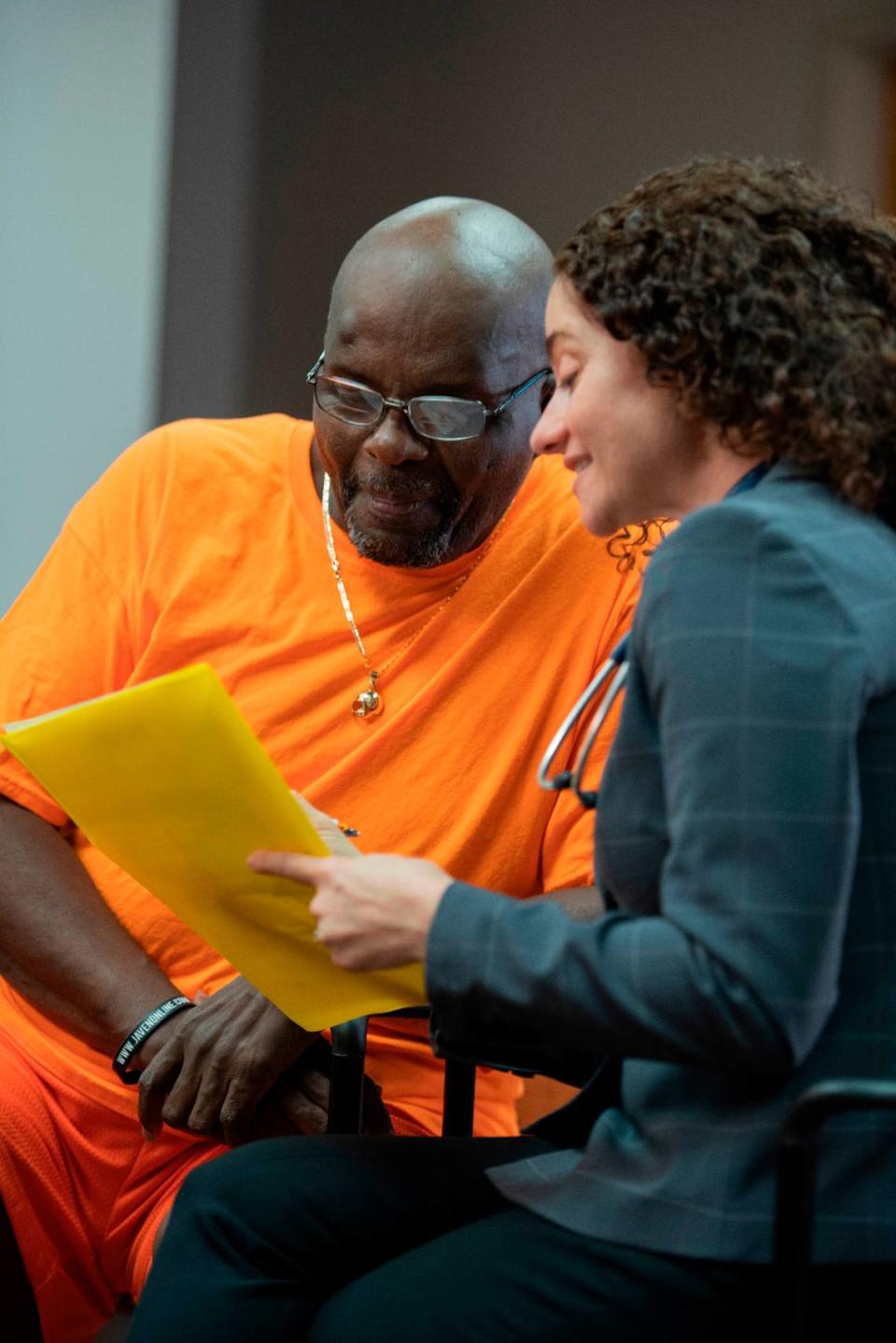Diabetics are at much greater risk for severe COVID, especially if they’re obese
When diabetic patients come down with COVID-19, they are at greater risk of severe illness, including more complications and longer hospitalizations.
“Once diabetics are in the hospital, they are at increased risk for intensive care treatment and at increased risk of mortality — a 50 percent increase in mortality,” said Dr. Vineeth Mohan, chairman of endocrinology at Cleveland Clinic Florida in Weston.

They also don’t do as well on ventilators and take longer to heal from wounds and surgeries, he said. “There is just a higher risk across the board.”
Some of the treatments for COVID-19 also can cause diabetes to be more severe, said Dr. Amy Aronovitz, chief of adult endocrinology at Memorial Healthcare System. Steroids, for example, can raise blood sugar, she said.

The question researchers are now wrangling with is if, beyond the traditional risks associated with being a diabetic, there is something unique about the novel coronavirus that amplifies its effects in diabetics.
An article recently published in The Lancet, a British medical journal, said that while initial reports on poor prognosis focused on people with type 2 diabetes, more recent surveys have indicated that those with type 1 diabetes also are at risk for more severe bouts of COVID-19.
“The reason for worse prognosis in people with diabetes is likely to be multifactorial,” said the article in The Lancet.
Advanced age, ethnicity, sex, a weakened immune system and chronic inflammatory state, obesity, and other underlying conditions such as high blood pressure and cardiovascular disease all can play into worse outcomes for diabetics, especially if their diabetes is poorly controlled.
But Dr. Gianluca Iacobellis, a researcher at University of Miami Health System, thinks there may be something more, something unique to COVID-19, contributing to the severe complications seen in some diabetics.
COVID, diabetes and obesity connections
People with diabetes would be expected to have worse outcomes, especially if they are suffering from one or more diabetic complications, he said. “But it’s not just that,” said Iacobellis. “What is peculiar is the interplay of COVID-19, diabetes and obesity.”

Obesity, which is common in type 2 diabetics, is emerging as a risk factor in COVID-19 cardio-pulmonary complications, said Iacobellis.
Those who carry their weight mostly around the abdomen — the so-called apple-shaped physique — and have fat deposits on their heart, kidneys and liver appear to be at higher risk, he said.
University of Miami researchers found that once the virus gets into the body, fat tissue may be used as a reservoir for the virus, and it seems that the more visceral fat a patient has, the more the virus is amplified, said Iacobellis. Visceral fat is the fat stored within the abdomen, near several vital organs.
“Preliminary data have indicated that the new COVID-19 cases are increasing among younger adults with obesity,” Iacobellis said in a paper he co-authored for Obesity, the journal of The Obesity Society. The incidence of obesity in the United States now exceeds 40 percent, he noted.
So what’s the greater risk factor — diabetes or obesity? “Based on my studies, when it comes to COVID-19, it’s worse to be obese than diabetic,” said Iacobellis.
Hyperglycemia is COVID warning sign
Another red flag for possible COVID-19 respiratory complications is if patients have hyperglycemia, high blood sugar generally indicated by a reading above 180 milligrams per decimeter, on the first day they are admitted to the hospital.
“If on Day 1, the patient has hyperglycemia, it’s an early marker of an exaggerated inflammatory response,” said Iacobellis. The higher the blood sugar, the more severe complications are and the longer the hospital stay, he said.
The hyperglycemia/respiratory complications link also has been observed in patients who have no history of diabetes.
However, some of those cases might involve someone who is a borderline diabetic whose blood sugar levels have shot up because of the viral infection.
“Many people who get very sick with coronavirus may not know if they are diabetic or not. Some are at an early stage of the disease that hasn’t been diagnosed,” said Aronovitz.
There are many undiagnosed cases of diabetes in the United States. Of the 34.2 million Americans who had diabetes in 2018, about 7.3 million adults weren’t even aware they had the disease, according to the Centers for Disease Control and Prevention.
There also have been cases when a COVID-19 patient who isn’t a known diabetic seems to develop diabetes after contracting the coronavirus.
Contracting diabetes after COVID is being studied
Study of this phenomenon is still in the early stages, but some researchers theorize that the onset of diabetes after getting the coronavirus may result from the virus’ impact on not only the pancreas but also on fat tissue and other organs.
Iacobellis said there is preliminary evidence that the virus may bind to ACE2 receptors that are found in the pancreatic beta cells, the small intestines, the heart, kidneys, and fat tissue.
That could damage the pancreas, the organ that secretes insulin, and alter the metabolism of glucose. Insulin, a hormone, is needed to maintain normal glucose or blood sugar levels. “However, we need more research to evaluate this hypothesis,” said Iacobellis.
“The theory is that the virus attaches to these receptors. The virus is like a key and the receptors are like a lock,” said Dr. Heberto Valdes, an endocrinologist at Baptist Health.
But there is disagreement among scientists whether the ACE2 receptors actually are the doorway by which the coronavirus invades healthy cells.
To help track patients who have developed insulin-requiring diabetes after contracting COVID-19, a global registry has been set up, said Cleveland Clinic’s Mohan.
“We need more data to know exactly what’s going on. This is very intriguing, but nothing has been proven at this point,” said Valdes.
Iacobellis said it’s unclear if sudden onset diabetes after coronavirus is permanent. “My feeling is that it is unlikely to be permanent. It’s like an acute inflammation of an organ,” he said. “More research is needed.”
Prior to the pandemic, Mohan said he urged patients to lose weight and keep their blood sugar well-controlled to avoid long-term complications associated with diabetes such as nerve and eye damage, cardiovascular disease, and kidney problems.
“I was thinking of their risks five or 10-plus years out,” he said. “Now I’m thinking about their risks tomorrow or next week. It’s a completely different mindset.”
Keeping diabetes controlled during pandemic
Doctors say the most important things diabetics can do during the pandemic are to take every precaution to avoid getting the virus in the first place and to keep their diabetes well-controlled through diet, exercise, taking their medications and staying in touch with their physicians.
“The most important advice is prevention — the best control possible. That’s really the only way to prevent complications,” Valdes said. “Stay away from crowds; if an activity is not 100 percent necessary, avoid it.”
That’s what Richard Hennie, a 68-year-old school crossing guard supervisor who lives in West Park, is trying to do. Hennie, an insulin-dependent diabetic, and his wife don’t eat out anymore. Their date nights are walking or sitting in a nearby park. He masks up whenever in public, wears gloves when pumping gas and at the grocery store, and disinfects himself after every outing.
When the pandemic began, “being shut in, I found myself eating more, munching on stuff in between meals, mostly to comfort myself. That has been a challenge,” said Hennie. He gained five pounds.
But Hennie said he had worked too hard to become compliant to give into the pandemic. When he first began seeing Dr. Jennifer Goldman at Memorial Health a few years ago, he said, “I was a wreck when I came in. Nothing was under control.”

His weight had ballooned to 285 pounds and he was taking 35 units of two different kinds of insulin daily. Now he’s down to 203 pounds, walks as many as four miles a day and has reduced his insulin intake to just four units a day plus a pill.
When he saw he was gaining a few pounds during the pandemic, he took himself to task. With the help of Goldman, his primary care physician, Hennie redoubled his efforts to keep his blood glucose levels in check.
He is scrupulous about monitoring his blood sugar levels twice daily, taking his temperature and blood oxygen levels, noting if he has a cough or other COVID-like symptoms, and sending his results to MyChart, an online medical records service, every Friday for Goldman to review.
“I am not letting the pandemic discourage me. We just have to keep moving forward,” said Hennie. “You have to be and stay vigilant. I don’t intend to check out. I want to be here.”
Mimi Whitefield can be reached at mimiwhitefield@gmail.com or on Twitter @heraldmimi

